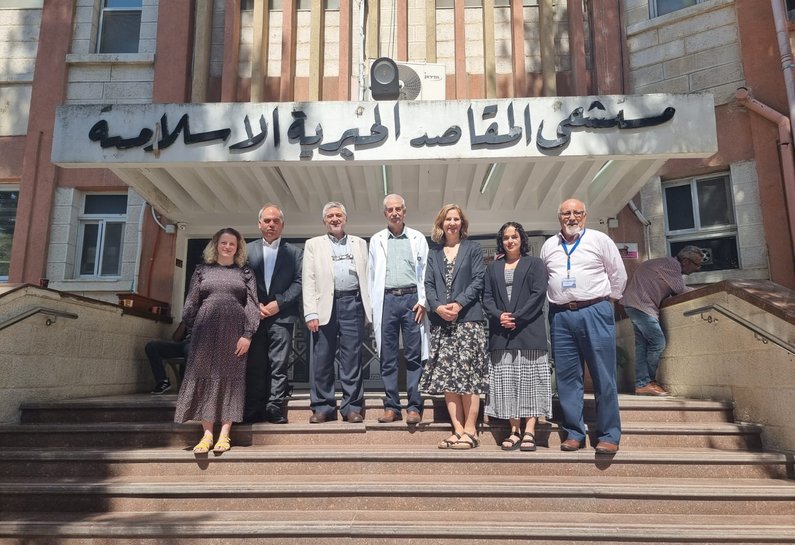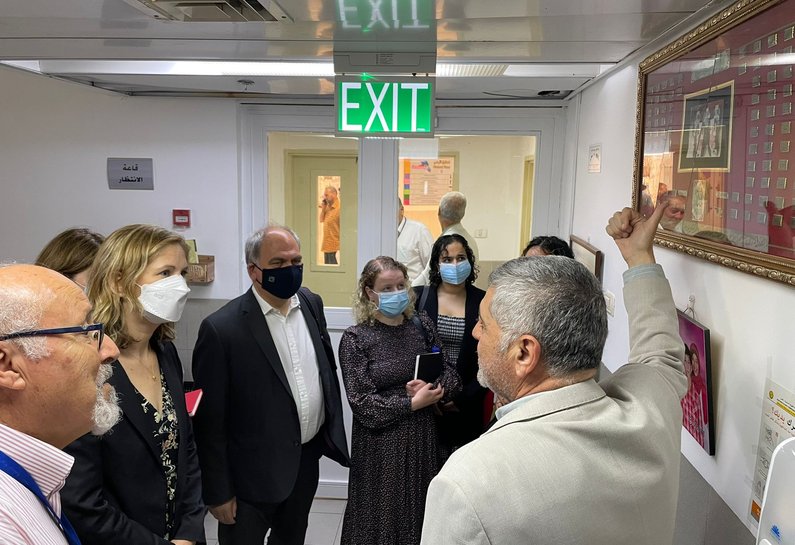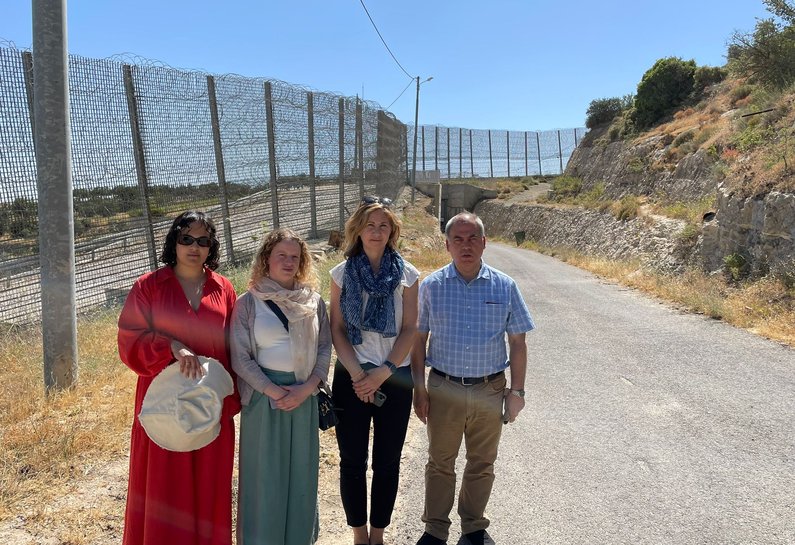UK MPs witness systematic discrimination and fragmentation in the West Bank

The Shadow Minister for the Middle East and North Africa, Bambos Charalambous (Enfield, Southgate), was joined by Anna McMorrin, Shadow Minister for Victims and Youth Justice (Cardiff North), Olivia Blake (Sheffield Hallam) and Nadia Whittome (Nottingham East). Over a four-day delegation, MPs witnessed how policies of systematic discrimination and fragmentation, imposed upon Palestinians wherever they reside in the occupied Palestinian territory (oPt), are severe detriments to their health and dignity.
On the first day, the MPs visited Al Makassed hospital in East Jerusalem, where they heard from the Head of the Neonatal Unit, Dr Hatem Khamash, about the impact of Israel’s restrictive permit regime on new-born babies. Mothers from the West Bank or Gaza who are in need of specialist care for their new-borns must obtain a permit from the Israeli authorities to travel to hospitals in East Jerusalem.
Once the permit expires, mothers, especially from Gaza, are forced to return home and leave their babies alone in the neonatal unit. When their babies are ready to be discharged, families must once again apply for a permit to be reunited with their babies and return home together. This devastating scenario is one that MPs have witnessed time and time again, including Dr Rosena-Allin Khan and Wes Streeting.

From the hospital, we met with Rami and Budour of the Jerusalem Legal Aid and Human Rights Center (JLAC), and headed to the family of Shireen Abu Akleh, a prominent Palestinian journalist who was fatally shot while covering an Israeli army raid in the West Bank city of Jenin on 11 May. Shireen’s family reiterated to us their call for an independent investigation into her death, and for those responsible to be held accountable. Leaving Shireen’s home, Aseel Baidoun, MAP’s Advocacy and Communications Officer, explained why Shireen’s killing hit home for many who didn’t know her personally:
“For us as Palestinians, we think – if Shireen can be killed, a respected and well-known journalist, wearing her press vest, and in view of the international community; if her funeral can be attacked by Israeli forces while all eyes are focused on it – what does that mean for the rest of us?”
Rami and Budour from JLAC also took us to visit the El Kurd and Salem families, who face the risk of displacement from their neighbourhood of Sheikh Jarrah. We met activists in Silwan, who explained the threat of home demolitions in their neighbourhood, and visited MAP’s partner the Saraya Center, in the Old City of East Jerusalem, where staff highlighted the impact of Israel’s discriminatory policies on Palestinian youth, education and culture.
On the second day, we accompanied the Palestinian Medical Relief Society (PMRS) mobile clinic on a visit to a Palestinian community in the E1 area of ‘Area C’ in the West Bank, where Israel’s discriminatory planning and zoning regime makes it almost impossible to build permanent infrastructure, including healthcare facilities. The community explained the challenges they face in accessing healthcare, where they are forced to travel long distances to reach hospitals, as well as the almost constant threat of demolitions – including against the community’s kindergarten, which PMRS uses to host its clinic, and which is funded by the European Union and the UK. They also described the daily aggression they face from the Israeli settlers who live in the illegal settlements nearby.
From there, we headed to Beita, in the northern West Bank’s Nablus Governorate, accompanied by the Palestine Red Crescent Society (PRCS) who explained that their medical teams faced continuous obstacles to treating Palestinians injured by Israeli forces while protesting a new settlement outpost. Facing road closures which prevented ambulances from accessing hospitals, and direct attacks on their staff, PRCS set up an emergency field hospital to treat the injured on-site.
Al Haq, a Palestinian human rights organisation, took us to the village of Burin, where we heard from families who faced settler violence on a regular basis. One person told us how, in the weeks prior to our visit, settlers attacked him and his family home, leaving him with two broken arms and his two children terrified, while Israeli forces fired tear gas canisters at those who’d arrived to support the family.

Day three began with a visit to the Ofer military court, accompanied by Military Court Watch, where we met the family of a 14-year-old Palestinian boy who had been arrested in the days prior, accused of throwing rocks. The father recalled that his son had been picking fruit, when Israeli forces began to chase him and shot him in the leg using live fire.
After his release from hospital, and hours of nonstop interrogation without his parents or a lawyer present, he sat in front of us in the court, unable to stand due to his injury. Upon our return, Anna McMorrin MP recalled that the young boy "could barely stand and had been given no pain relief for his gun-shot wound. The Judge saw that we were watching and awarded bail with stringent conditions and house arrest."
From the military courts, we travelled to Ramallah, where we met with Defence for Children International – Palestine and heard from two young Palestinians. They told chillingly similar stories of being arrested as teenagers by Israeli forces, blindfolded and hand-cuffed, before being taken to a ‘detention yard’ where they were left for up to two days. After days of isolation and interrogation, prevented from seeing a parent or lawyer, and threats to arrest family members, the boys told us they felt they had no other choice but to falsely confess to their accusations.
On our final day, we drove to Hebron with brief stops in al Walaja and in al-Arroub refugee camp, guided by the UN agency for Palestinian refugees (UNRWA), who spoke to us about the continued financial and political challenges they face, explaining that the organisation is $50 million short of covering staff salaries for the year.
In Hebron, Breaking the Silence guided us along Shuhada Street – formerly a bustling Palestinian market street – and its “sterilised zones,” where Palestinians today may not walk. As we wandered along the street, our guides pointed out old Palestinian shops that had been shuttered by Israeli forces, not too far from a new settlement development in which settlers have been permitted to live for free, with access to subsidised education and comprehensive transport links.
Our journey ended with a final dinner with Palestinian activists in Hebron, who told us of the gendered impacts of the violence they face when navigating checkpoints to visit family or go to school. One woman told us how, on Eid, her family were prevented from entering the Tel Rumeida checkpoint to celebrate with her – and so, she carried huge plates of home-cooked food through the checkpoint, set it down on the street and celebrated the holiday with her family there.
Throughout the week, the MPs also met with representatives of the Palestinian Authority, the Israeli Ministry of Foreign Affairs, and Meretz, the British Consul General, Diane Corner, as well as Palestinian civil society, and Israeli, Palestinian and international human rights organisations.
Upon their return, the MP’s spoke about their experiences in the oPt. Anna McMorrin wrote that the visit to Al Makassed showed “the stark reality of how life impacts even the most basic of human rights for Palestinians,” while Nadia Whittome wrote that “from healthcare to justice to education, I witnessed a system of oppression that seemed to consume every aspect of Palestinian life.” The Shadow Middle East Minister, Bambos Charalambous recognised that the UK must “ultimately look to systemic change rather than piecemeal improvements,” and be “robust in asserting international law and defending human rights.”
We are grateful to all who took time to speak to us throughout the week to illustrate to UK parliamentarians the day-to-day toll that Israel’s policies of systematic discrimination and fragmentation take on Palestinians rights to health and dignity.
Palestinians will not be able to live with health and dignity until the systematic discrimination and fragmentation they face is finally brought to an end. Stand up for their equal rights by signing the pledge.
Related content

